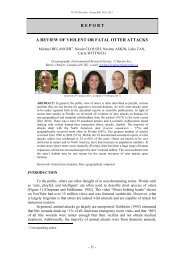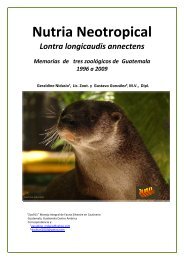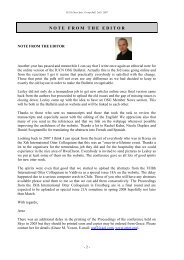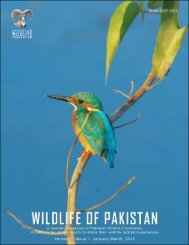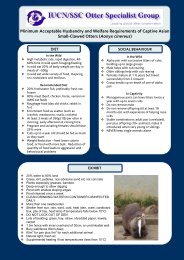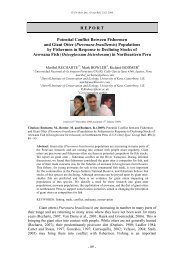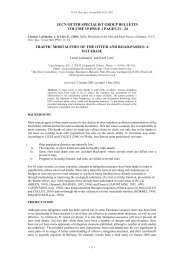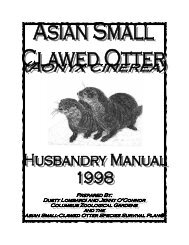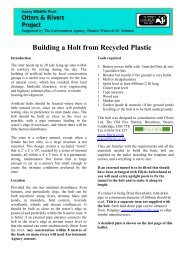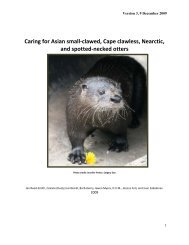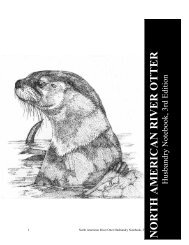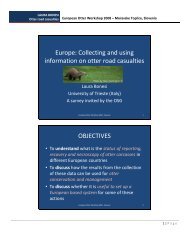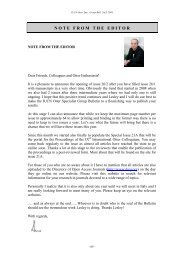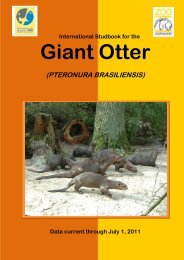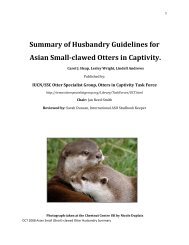International Giant Otter Studbook Husbandry and Management
International Giant Otter Studbook Husbandry and Management
International Giant Otter Studbook Husbandry and Management
Create successful ePaper yourself
Turn your PDF publications into a flip-book with our unique Google optimized e-Paper software.
substrates for most of his life (i.e. 11 years at that time). This otter had very little l<strong>and</strong> area,<br />
because of an unsuitable l<strong>and</strong> to water ratio, <strong>and</strong> he was kept on all concrete surfaces. For the<br />
following year <strong>and</strong> in other enclosures he was offered mostly hard surfaces (both with<br />
appropriate l<strong>and</strong> to water ratios). The remaining fourth otter had limited exposure to a small<br />
digging pit <strong>and</strong> soft substrates that could not be dug into or no soft substrates for 4 years.<br />
Appropriate l<strong>and</strong> to water ratios were offered. In the following 7 years (11 years was his life<br />
span at that time) no digging areas or soft substrates were offered. This animal was housed on<br />
all concrete surfaces <strong>and</strong> a very small l<strong>and</strong> area. (The aforementioned otters were housed in at<br />
least 2 or more different institutions during their life times.) These otters obviously had no<br />
sufficient area to carry out the full extent of their innate digging <strong>and</strong> grooming behaviors <strong>and</strong> in<br />
some cases no opportunity to perform digging behaviors at all. They also, for most of their lives,<br />
had no or little comfortable l<strong>and</strong> area on which they could play <strong>and</strong> exercise. The frequency,<br />
duration, <strong>and</strong> intensity of these behaviors were significantly <strong>and</strong> abnormally decreased as<br />
compared to a healthy otter <strong>and</strong> the location where these behaviors were carried out within their<br />
enclosures were very limited (e.g. to just small digging or grooming areas). They carried these<br />
terrestrial behaviors out to a minimal degree or not at all. They spent much more of their<br />
day in the water than on l<strong>and</strong> (including their resting hours) <strong>and</strong> most of their water<br />
activities were limited to swimming aimlessly or at times swim pacing (i.e. a stereotypical<br />
behavior performed in the water). These animals also exhibited daily either some or all of the<br />
following behaviors: nervousness, fear of change, tension, stress, depression, boredom,<br />
frustration, <strong>and</strong>/or very dulled/lack of alertness, attentiveness, <strong>and</strong> curiosity. During<br />
new/unusual situations <strong>and</strong> additionally for two otters during cub-rearing, abnormally elevated or<br />
excessive levels of stress were exhibited <strong>and</strong> successful adjustment to these situations was<br />
seriously compromised. (See Section 10 for detailed information on such occurrences).<br />
Three of these four animals (the first 3 described) were first exposed to enclosures which offered<br />
the recommended deep digging areas <strong>and</strong> “nearly appropriate” grooming <strong>and</strong> l<strong>and</strong> areas at<br />
approx. the latest ages that were reported above. I.e. “nearly appropriate” means that the<br />
majority (rather than the entire or nearly all as recommended) of the l<strong>and</strong> areas were covered<br />
with soft loose substrates (mulch/s<strong>and</strong>). Although, eventually their enclosures were improved so<br />
that they were offered digging, grooming, <strong>and</strong> l<strong>and</strong> areas (i.e. appropriate substrates nearly<br />
entirely covered all the l<strong>and</strong> <strong>and</strong> floor areas) as recommended. The fourth animal was first<br />
exposed to an enclosure that was appropriately furnished as recommended, but this only<br />
occurred 5 months before the conclusion of this particular study. Appropriate l<strong>and</strong> to water<br />
ratios <strong>and</strong> other important natural enrichment furnishings (i.e. large logs both on l<strong>and</strong> <strong>and</strong> in the<br />
water, bamboo st<strong>and</strong>s etc.) were also offered to all of these animals. After these animals were<br />
first exposed to appropriate or nearly appropriate enclosure conditions <strong>and</strong> underwent an<br />
“adjustment period”, they all dug, groomed, played <strong>and</strong> exercised on l<strong>and</strong> with a moderate<br />
degree of frequency, duration, <strong>and</strong> intensity as compared to a healthy otter. They also spent<br />
much more of their day (including their resting hours) on l<strong>and</strong> than in the water. They although<br />
used the entire l<strong>and</strong> area to carry out their terrestrial behaviors. The stereotypical swim pacing<br />
was no longer performed <strong>and</strong> their other abnormal unhealthy behaviors either were significantly<br />
reduced (i.e. aimless swimming etc.) or completely eliminated (i.e. very dulled/lack of alertness,<br />
attentiveness, <strong>and</strong> curiosity; depression, nervousness etc.). Just with appropriate enclosure<br />
conditions alone (i.e. appropriate substrates, l<strong>and</strong> to water ratios, <strong>and</strong> deep digging areas) they<br />
were able to make significant or full recovery from their mental <strong>and</strong> behavioral health<br />
problems <strong>and</strong> abnormalities. (Either the animals were moved to a totally new enclosure or<br />
only the conditions aforementioned were changed within the enclosure they had been living in.)<br />
These recoveries were achieved within approx. a half a year to one year’s time. These animals<br />
are still behaving in the same way, i.e. either for a couple/few years after the conclusion of this<br />
122



